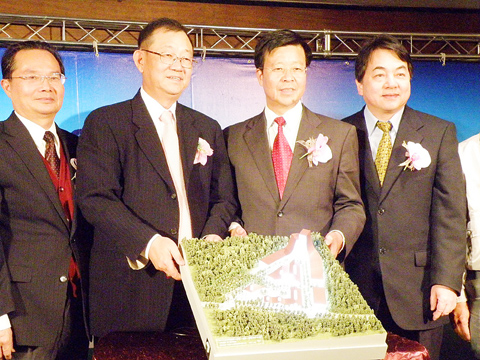Taiwan Land Development Corp (台灣土地開發公司) yesterday signed a 50-year build-operate-transfer (BOT) agreement with the Kinmen County Government, promising to turn the former war-torn island into an international tourism and leisure spot in five years with an initial budget of NT$3.69 billion (US$113.3 million).
“We hope that when the project is completed, it will bring in tens of billions [of New Taiwan dollars] in economic benefits to Kinmen,” Kinmen County Commissioner Lee Chu-feng (李炷烽) told a signing ceremony.
The project will create 1,500 job opportunities, more than 60 percent of which will be reserved for local residents, he said.

PHOTO: WANG LIANG-YUN, TAIPEI TIMES
That excludes workers that will be employed during the project’s construction, the land developer said.
The BOT project covers a 7.45 hectare lot 200m north of Kinmen Shanyi Airport, where a hotel, exhibition and conference halls, bonded warehouses, recreation and shopping malls, as well as a duty-free shop will be built starting next year and completed in three to five years.
Taiwan Land Development chairman Chiu Fu-sheng (邱復生) said the entire project could cost up to NT$10 billion, 50 percent of which would come from company funds and the remaining 50 percent would be raised from investors at home and abroad.
Chiu said institutional investors or property developers in Hong Kong, China and the US had expressed interest in taking part in the project. He did not elaborate, citing confidentiality.
Seven retailers, including duty-free Ever Rich DFS Corp (昇恆昌), Hsin Tung Yang Co (新東陽) and local specialty shops such as Sheng Zu Food and Beverage Corp (聖祖食品) and knife manufacturer Master Wu Co (金合利鋼刀), have agreed to set up outlets in the leisure district there, the developer said.
Taiwan Land Development president Andy Lai (賴昭輝) said that the soon-to-be-built hotel would be a three or five-star establishment with 300 to 500 rooms.
He estimated that the 50-year project could contribute a minimum of NT$2.4 billion in tax revenue to the county government, while potential tourism revenue could reach at least NT$2 billion per year.
If the estimated 1.7 million visitors traveling via the “small three links” — with the number forecast to rise to 2 million in two years — were to spend NT$1,000 each, the county government could get a revenue boost of NT$2 billion per year, he said.
Moreover, if 1 percent to 10 percent of 21 million tourists traveling to Xiamen, China, could extend their trip to include Kinmen at a cost of NT$10,000, the county government could further see an income of between NT$2.1 billion to NT$21 billion each year, he added.
Lee said Kinmen now attracts about 500,000 tourists per year, including 150,000 Chinese tourists since late last year, including 50,000 who stayed overnight.
High-quality kaoliang liquor, which is sold for 300 yuan (US$44) in Kinmen and 1,188 yuan in China, is popular among Chinese tourists.

Sweeping policy changes under US Secretary of Health and Human Services Robert F. Kennedy Jr are having a chilling effect on vaccine makers as anti-vaccine rhetoric has turned into concrete changes in inoculation schedules and recommendations, investors and executives said. The administration of US President Donald Trump has in the past year upended vaccine recommendations, with the country last month ending its longstanding guidance that all children receive inoculations against flu, hepatitis A and other diseases. The unprecedented changes have led to diminished vaccine usage, hurt the investment case for some biotechs, and created a drag that would likely dent revenues and

Global semiconductor stocks advanced yesterday, as comments by Nvidia Corp chief executive officer Jensen Huang (黃仁勳) at Davos, Switzerland, helped reinforce investor enthusiasm for artificial intelligence (AI). Samsung Electronics Co gained as much as 5 percent to an all-time high, helping drive South Korea’s benchmark KOSPI above 5,000 for the first time. That came after the Philadelphia Semiconductor Index rose more than 3 percent to a fresh record on Wednesday, with a boost from Nvidia. The gains came amid broad risk-on trade after US President Donald Trump withdrew his threat of tariffs on some European nations over backing for Greenland. Huang further

CULPRITS: Factors that affected the slip included falling global crude oil prices, wait-and-see consumer attitudes due to US tariffs and a different Lunar New Year holiday schedule Taiwan’s retail sales ended a nine-year growth streak last year, slipping 0.2 percent from a year earlier as uncertainty over US tariff policies affected demand for durable goods, data released on Friday by the Ministry of Economic Affairs showed. Last year’s retail sales totaled NT$4.84 trillion (US$153.27 billion), down about NT$9.5 billion, or 0.2 percent, from 2024. Despite the decline, the figure was still the second-highest annual sales total on record. Ministry statistics department deputy head Chen Yu-fang (陳玉芳) said sales of cars, motorcycles and related products, which accounted for 17.4 percent of total retail rales last year, fell NT$68.1 billion, or

Macronix International Co (旺宏), the world’s biggest NOR flash memory supplier, yesterday said it would spend NT$22 billion (US$699.1 million) on capacity expansion this year to increase its production of mid-to-low-density memory chips as the world’s major memorychip suppliers are phasing out the market. The company said its planned capital expenditures are about 11 times higher than the NT$1.8 billion it spent on new facilities and equipment last year. A majority of this year’s outlay would be allocated to step up capacity of multi-level cell (MLC) NAND flash memory chips, which are used in embedded multimedia cards (eMMC), a managed